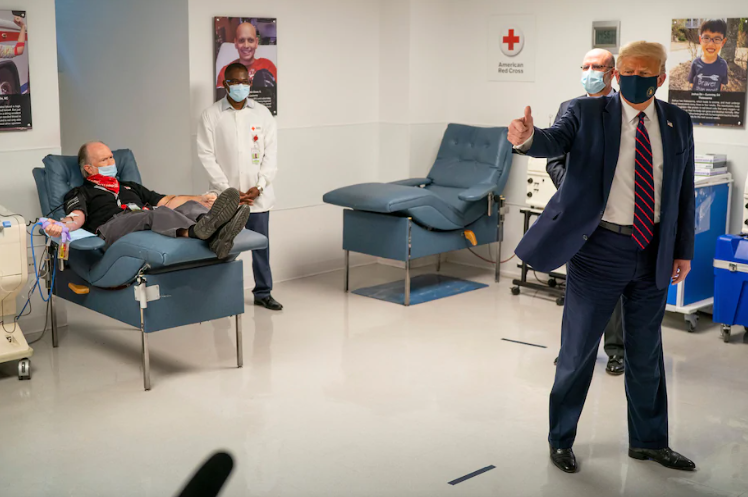
 i_need_contribute
i_need_contribute

President Trump looks on as patients donate plasma at the American Red Cross headquarters Thursday. (Doug Mills/New York Times/Pool/Shutterstock)
President Trump issued a national call to action Thursday, exhorting people who have recovered from covid-19 to donate blood plasma to help others fight the disease and boost the nation’s supply.
“If you’ve had the virus, if you donate, it would be a terrific thing,” Trump said on a visit to the American Red Cross headquarters. “We really need donations of the plasma. To those that have had the virus, you’ve gotten through it. And I guess that means you have something very special there."
The call for donors is based on a simple, but powerful fact about the immune system. People who recover from a coronavirus infection typically have virus-blocking antibodies circulating in their blood in the weeks after they recover. Those antibodies can be harvested in plasma donations and transfused to the next people who get sick, helping boost their immune systems. In contrast, developing treatments for a new virus is an uncertain and time-consuming process.
Blood plasma from people who have successfully recovered from coronavirus infection has been widely used in the United States, even though researchers are still gathering evidence to definitively show it works. About 50,000 people have been transfused with the treatment, called convalescent plasma, under an expanded access program sponsored by the Food and Drug Administration.
“The way in which people have been doing this is truly inspiring,” said Francis Collins, director of the National Institutes of Health. “Americans seem to believe that biblical verse, ‘To whom much has been given, much will be required.’ 'To whom coronavirus has been given and they’ve recovered, apparently they have recognized they have something they can do to help the next person.”
Antibody tests that detect whether people have coronavirus-fighting antibodies will be included for free to all blood donors.
Convalescent plasma is an approach that has been used against measles, respiratory diseases and, more recently, Ebola. But the historical data showing that it works has been relatively mixed, with some evidence suggesting strongly that it works and other studies showing it has little effect.
“This is an idea that goes back almost a century, but what’s happened — in the past, anyway — is that it seems that people don’t think about convalescent plasma until the viral epidemic is up and running — and then by the time they get the clinical trial set up, there’s not a need anymore,” said Kevin Schulman, a professor of medicine at Stanford University School of Medicine who is working on one of the clinical trials.
Severely sick, hospitalized patients in the United States have been receiving convalescent plasma as a treatment since March. The data so far indicate the treatment is safe and shows encouraging signs of working, particularly if given very early in the course of disease, but scientists are starting up large clinical trials to rigorously measure its effects, backed by millions of taxpayer dollars.
“We don’t have grade-A, prime data, yet, and that leaves clinicians, and most importantly families and physicians with the challenge of: how do we interpret incomplete data,” said Shmuel Shoham, associate professor of medicine at the Johns Hopkins University School of Medicine.
Shoham and colleagues at Hopkins are testing whether plasma can be useful as an outpatient treatment, with $35 million in funding from the Defense Department. One trial will test the treatment in people with a known exposure to the coronavirus to see if it prevents disease. Another will test whether it is effective in people with early disease, who aren’t sick enough to go to the hospital.
A different trial, called C3PO, supported by $7 million from the National Institutes of Health, will test whether plasma transfusions could help patients who show up in the emergency room and are at high risk of developing severe disease.
A trial based in several New York hospitals is testing whether convalescent plasma helps hospitalized patients.
Evidence that convalescent plasma works will also help inform other efforts to develop coronavirus countermeasures. Scientists have been encouraged by early vaccine tests that show they trigger antibodies in the blood capable of neutralizing the virus, just like the ones that develop after a natural infection.
Much of the hope for coronavirus treatments lies in a class of drugs called monoclonal antibodies, antibody drugs that block infection.
Companies are also working to develop a highly purified product from blood plasma, called hyperimmune globulin, that would have more consistency. The development of such a product could surmount some of the issues with plasma, including the variability in the amount of antibodies among people who donate, with some people developing a very strong antibody response and others having small amounts or no antibodies.